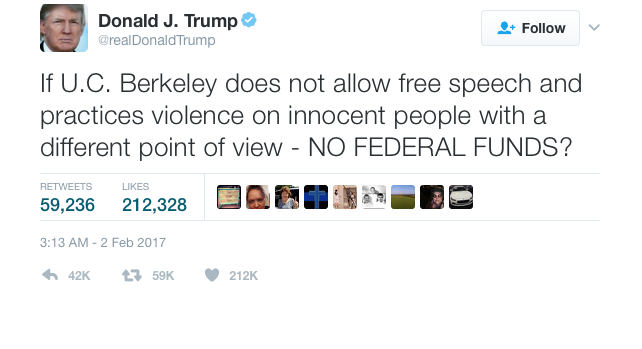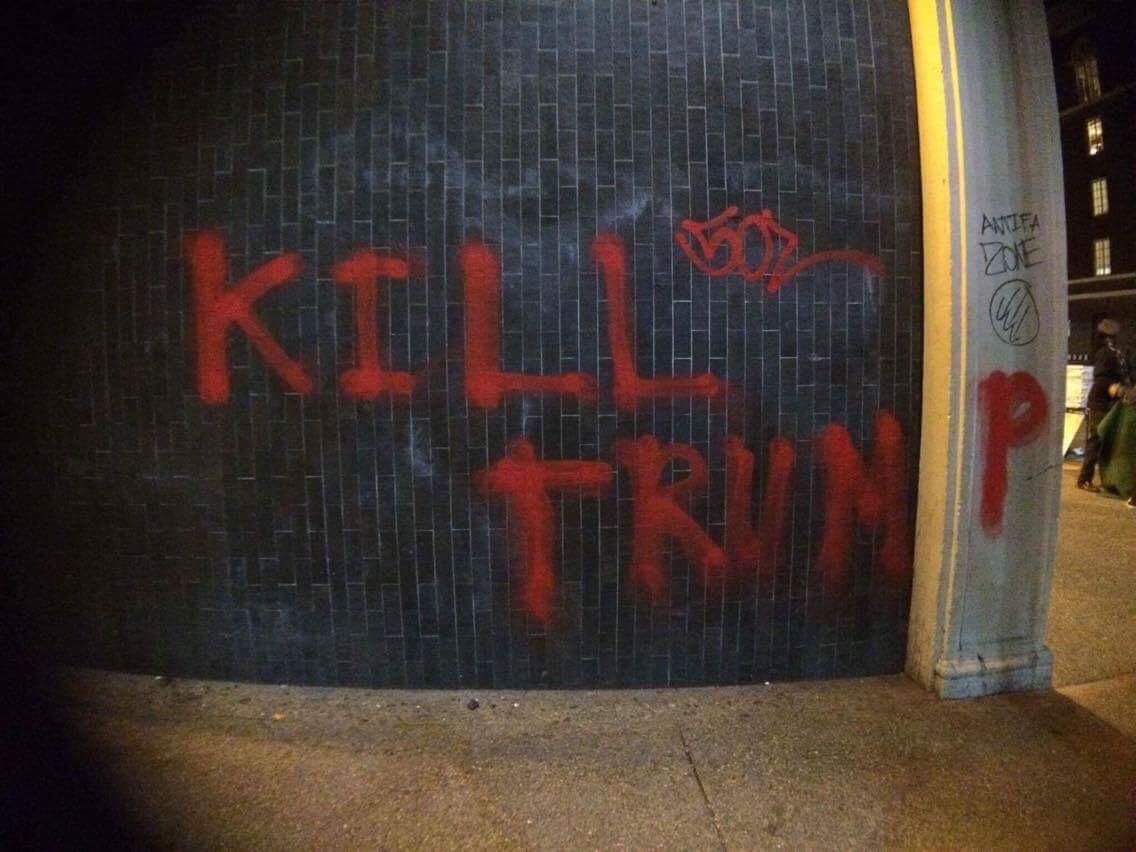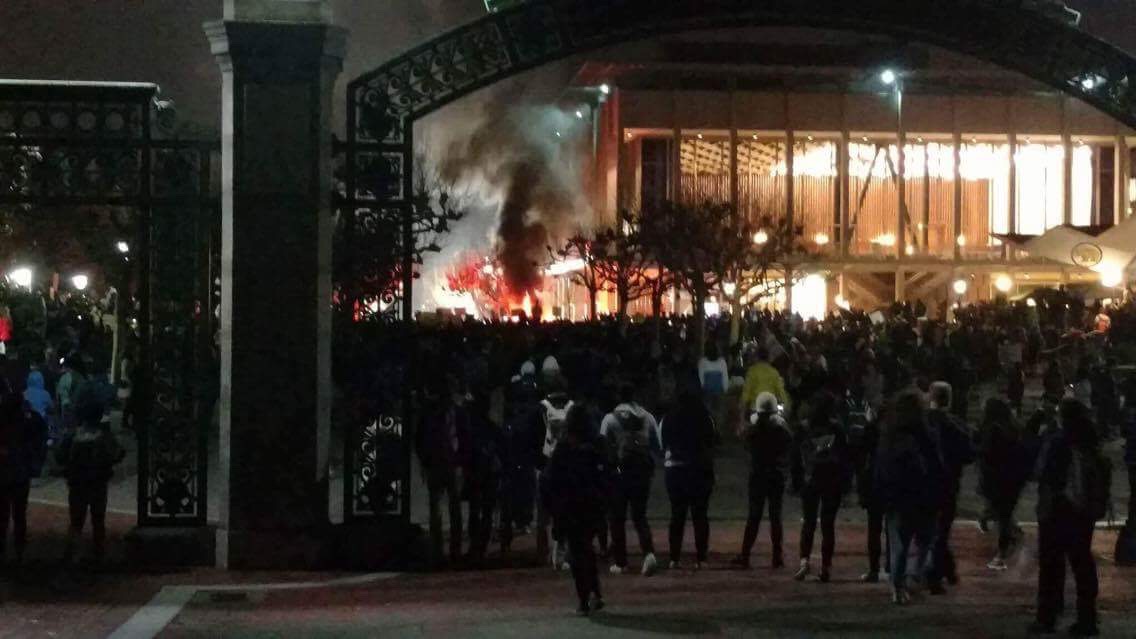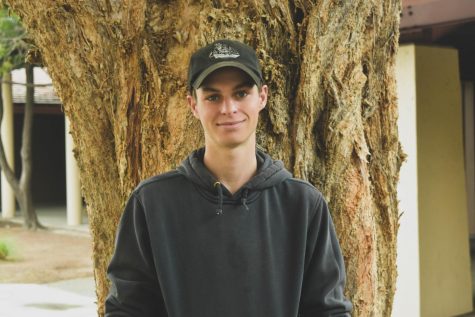What began as a peaceful demonstration protesting an upcoming talk by British journalist Milo Yiannopoulos at University of California, Berkeley quickly turned ugly as an organized group of individuals, unaffiliated with the university, set objects aflame, shattered windows, vandalized the campus and neighboring city, driving the university to lock down and cancel the talk. According to Naviance data, there are approximately 100 Paly grads currently studying as undergraduates at Berkeley and many were witness to the chaotic sequence of events that followed.
Berkeley Students Respond

In a tweet the following morning, Donald Trump suggested withholding federal funds from UC Berkeley. After reading Trump’s tweet Ash Bhat, a sophomore at Berkeley, decided to take action. Bhat and his roommate Rohan Pai made an app called Presidential Actions. The purpose of this app is to notify a user “every time a presidential action is taken” including “executive orders, presidential memorandums, proclamations and more at your fingertips directly from the source,” according to the application description.
Josh Yuen, Paly alumni, former Paly Voice managing editor, and Berkeley freshman was inside the office of the Daily Californian as the protest intensified and the campus went on lockdown. Yuen emphasized that although the protest turned ugly, students still came together at the end to assist in cleaning the aftermath of the chaotic night.
“I do want to make it clear that an unaffiliated group, not from the university, is responsible for turning an otherwise peaceful protest into what you saw,” Yuen said. “I knew that protests had begun around campus about three hours before Milo was due to speak, but wasn’t planning on being a part of it because I had a lot of work to do. I went [out to] the protest on the way back, out of curiosity, after the majority of the vandalism and broken windows and what not had taken place. Overall, it was loud, it was tense, and a pretty scary scene. It is unfortunate that this happened on Berkeley’s campus, but Berkeley students did a great job of organizing an event to clean up as much debris as possible.”
In a column written by Joseph Greenwell for the Daily Californian, Greenwell calls for those in the Berkeley community to be mindful of continuing a civil discourse.
“I am, above all else, calling for everyone in our community to adhere to our values of social justice and equity, staying true to being positive change agents in the world in these times.” Greenwell wrote. “And part of this integrity means sticking to our values of nonviolence and peaceful protest, respecting the lives and human dignity of others. Without civil discourse, we risk becoming those whose tactics we abhor. I know UC Berkeley is bigger and better than that. And if we wish to share and make our campus principles clear, we need to seek to understand and treat each other with humanity.”

First Amendment Implications
The free speech movement in 1964 at Berkeley started originally to have Berkeley lift the ban on on-campus political activities, as well as to recognize student rights to free speech and freedom of expression.
The Berkeley College Republicans, the group who organized Yiannopoulos’ talk released a statement on their website claiming that “The Free Speech Movement is dead.” However, Berkeley’s chancellor, Nicholas Dirks stated in an email to the student body that “The University of California Police concluded that the speaker had to be evacuated from campus for his own safety, thereby bringing the event to an end. We are now and will remain in the future, completely committed to Free Speech as essential to our educational mission and a vital component of our identity at UC Berkeley.”
What Happened
In mid-January, several Berkeley students called for the banning of Yiannopoulos’s speaking event, which prompted Berkeley Chancellor Nicholas Dirks to defend the event in a message to the campus community on Jan. 26 in order to promote the spreading of a variety of intellectual perspectives. On Feb. 1, as Yiannopoulos was preparing to speak, more than 1,000 demonstrators took to Sproul Plaza to protest Yiannopoulos’ event.

However, the night did not turn violent until a group known as the Black Bloc, unaffiliated with the university, began burning objects around the plaza, and as tensions rose campus police were forced to shut the event down because of safety concerns. The university released a public statement condemning the actions of those involved in the violent portions of the protest.
According to the Daily Californian, in a statement released by campus police spokesperson Sgt. Sabrina Reich, campus police arrested Edward Thomas Kuo, a 19-year-old man who is not affiliated with the campus, at the Milo Yiannopoulos protests Wednesday night. Donald Trump made a suggestion to withhold federal funding for the university in a tweet the following day. According to a Reuters article, it is unlikely that Trump could actually cut Berkeley’s funding, as the majority of federal funds are from grants and student aid.
Below is an interactive timeline of the events prior, during, and following the Berkeley riots. Click the text in each box for further information on each event.
Yiannopoulos intends to return to Berkeley, as expressed in a Facebook post Saturday morning, following the violent riots that broke out as a result of his appearance at the university.
“I’m planning to return to Berkeley to give the speech I was prevented from delivering,” Yiannopoulos said. “Hopefully within the next few months. I’ll keep you posted.”


